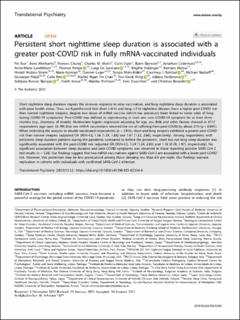Persistent short nighttime sleep duration is associated with a greater post-COVID risk in fully mRNA-vaccinated individuals
| dc.contributor.author | Xue, Pei | |
| dc.contributor.author | Merikanto, Ilona | |
| dc.contributor.author | Chung, Frances | |
| dc.contributor.author | Morin, Charles M. | |
| dc.contributor.author | Espie, Colin | |
| dc.contributor.author | Bjorvatn, Bjørn | |
| dc.contributor.author | Cedernaes, Jonathan | |
| dc.contributor.author | Landtblom, Anne-Marie | |
| dc.contributor.author | Penzel, Thomas | |
| dc.contributor.author | De Gennaro, Luigi | |
| dc.contributor.author | Holzinger, Brigitte | |
| dc.contributor.author | Matsui, Kentaro | |
| dc.contributor.author | Hrubos-Strøm, Harald | |
| dc.contributor.author | Korman, Maria | |
| dc.contributor.author | Leger, Damien | |
| dc.contributor.author | Mota-Rolim, Sérgio | |
| dc.contributor.author | Bolstad, Courtney J. | |
| dc.contributor.author | Nadorff, Michael | |
| dc.contributor.author | Plazzi, Giuseppe | |
| dc.contributor.author | Reis, Catia | |
| dc.contributor.author | Chan, Rachel Ngan Yin | |
| dc.contributor.author | Wing, Yun Kwok | |
| dc.contributor.author | Yordanova, Juliana | |
| dc.contributor.author | Bjelajac, Adrijana Koscec | |
| dc.contributor.author | Inoue, Yuichi | |
| dc.contributor.author | Partinen, Markku | |
| dc.contributor.author | Dauvilliers, Yves | |
| dc.contributor.author | Benedict, Christian | |
| dc.date.accessioned | 2024-03-12T09:38:00Z | |
| dc.date.available | 2024-03-12T09:38:00Z | |
| dc.date.created | 2023-02-28T12:30:17Z | |
| dc.date.issued | 2023 | |
| dc.identifier.issn | 2158-3188 | |
| dc.identifier.uri | https://hdl.handle.net/11250/3121912 | |
| dc.description.abstract | Short nighttime sleep duration impairs the immune response to virus vaccination, and long nighttime sleep duration is associated with poor health status. Thus, we hypothesized that short (<6 h) and long (>9 h) nighttime sleepers have a higher post-COVID risk than normal nighttime sleepers, despite two doses of mRNA vaccine (which has previously been linked to lower odds of long-lasting COVID-19 symptoms). Post-COVID was defined as experiencing at least one core COVID-19 symptom for at least three months (e.g., shortness of breath). Multivariate logistic regression adjusting for age, sex, BMI, and other factors showed in 9717 respondents (age span 18–99) that two mRNA vaccinations lowered the risk of suffering from post-COVID by about 21% (p < 0.001). When restricting the analysis to double-vaccinated respondents (n = 5918), short and long sleepers exhibited a greater post-COVID risk than normal sleepers (adjusted OR [95%-CI], 1.56 [1.29, 1.88] and 1.87 [1.32, 2.66], respectively). Among respondents with persistent sleep duration patterns during the pandemic compared to before the pandemic, short but not long sleep duration was significantly associated with the post-COVID risk (adjusted OR [95%-CI], 1.59 [1.24, 2.03] and 1.18 [0.70, 1.97], respectively). No significant association between sleep duration and post-COVID symptoms was observed in those reporting positive SARS-CoV-2 test results (n = 538). Our findings suggest that two mRNA vaccinations against SARS-CoV-2 are associated with a lower post-COVID risk. However, this protection may be less pronounced among those sleeping less than 6 h per night. Our findings warrant replication in cohorts with individuals with confirmed SARS-CoV-2 infection. | en_US |
| dc.language.iso | eng | en_US |
| dc.publisher | Nature | en_US |
| dc.rights | Navngivelse 4.0 Internasjonal | * |
| dc.rights.uri | http://creativecommons.org/licenses/by/4.0/deed.no | * |
| dc.title | Persistent short nighttime sleep duration is associated with a greater post-COVID risk in fully mRNA-vaccinated individuals | en_US |
| dc.type | Journal article | en_US |
| dc.type | Peer reviewed | en_US |
| dc.description.version | publishedVersion | en_US |
| dc.rights.holder | Copyright 2023 The Author(s) | en_US |
| dc.source.articlenumber | 32 | en_US |
| cristin.ispublished | true | |
| cristin.fulltext | original | |
| cristin.qualitycode | 1 | |
| dc.identifier.doi | 10.1038/s41398-023-02334-4 | |
| dc.identifier.cristin | 2130060 | |
| dc.source.journal | Translational Psychiatry | en_US |
| dc.identifier.citation | Translational Psychiatry. 2023, 13, 32. | en_US |
| dc.source.volume | 13 | en_US |

